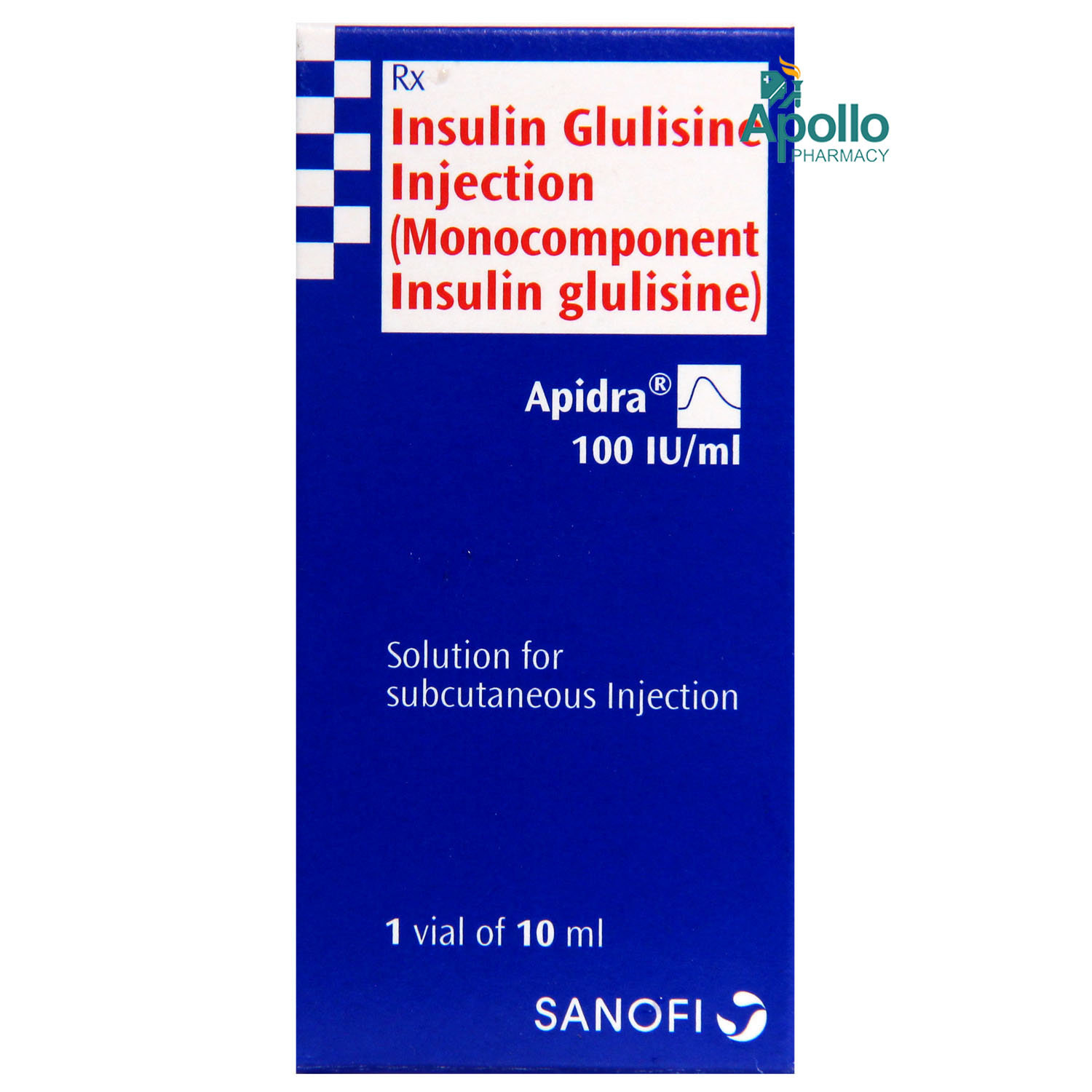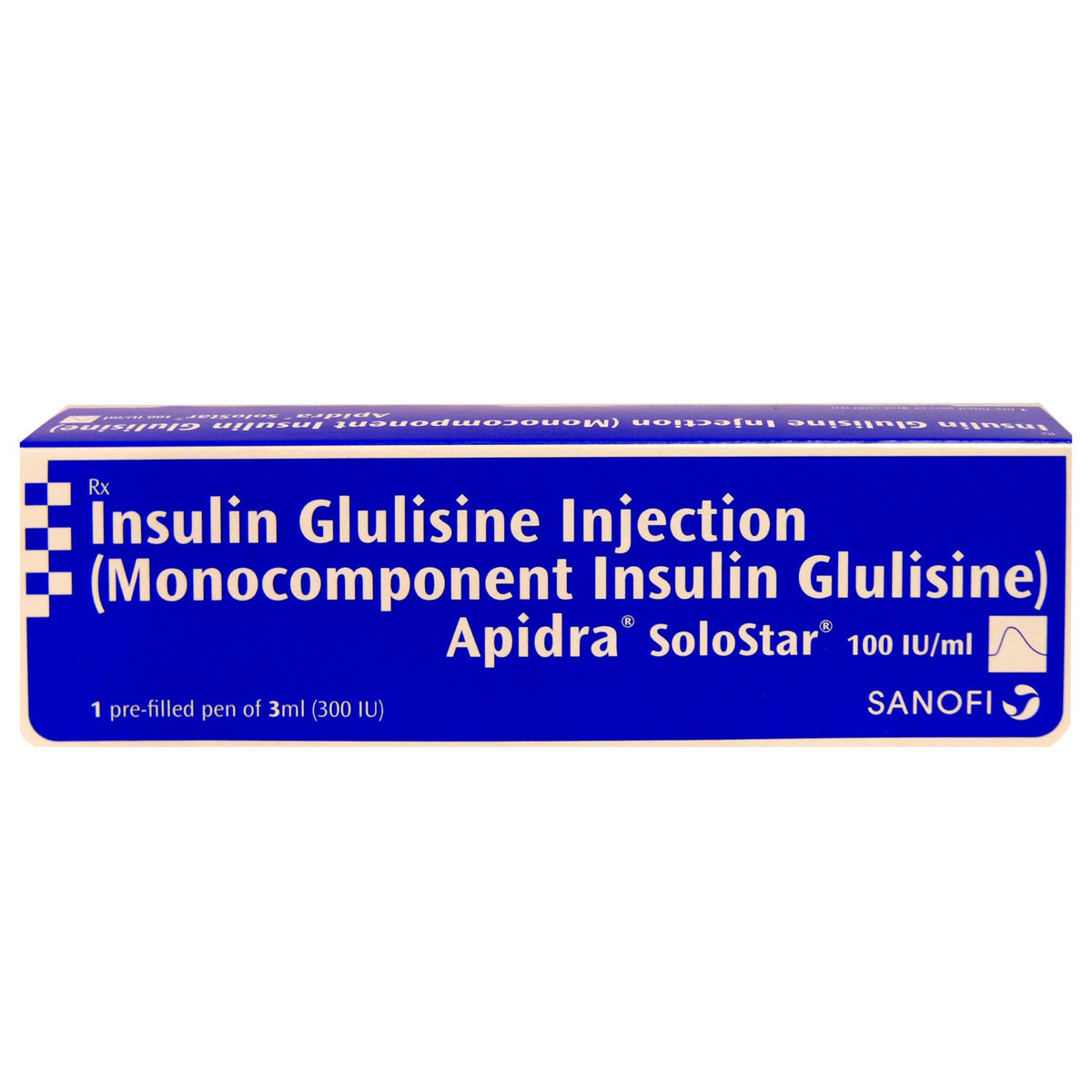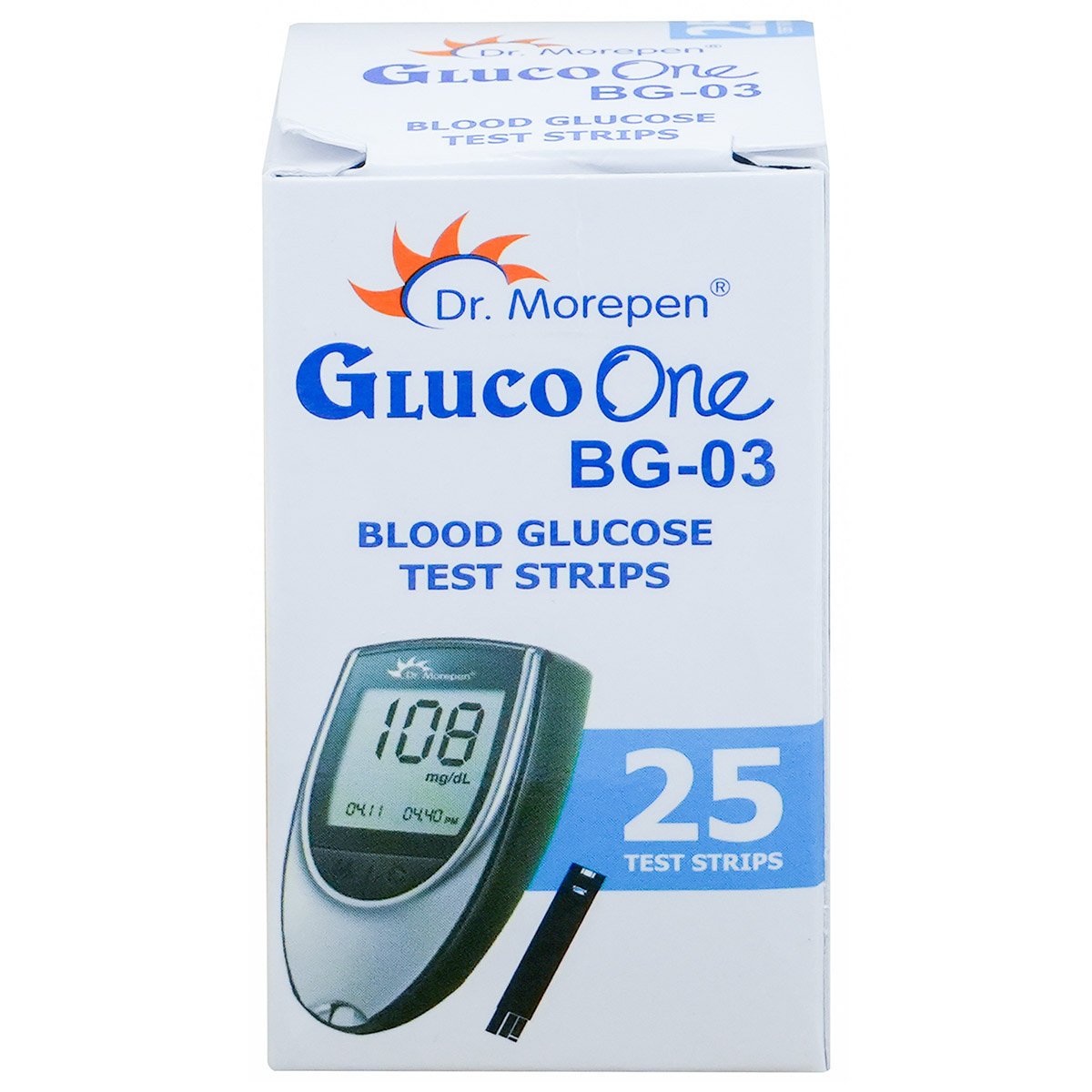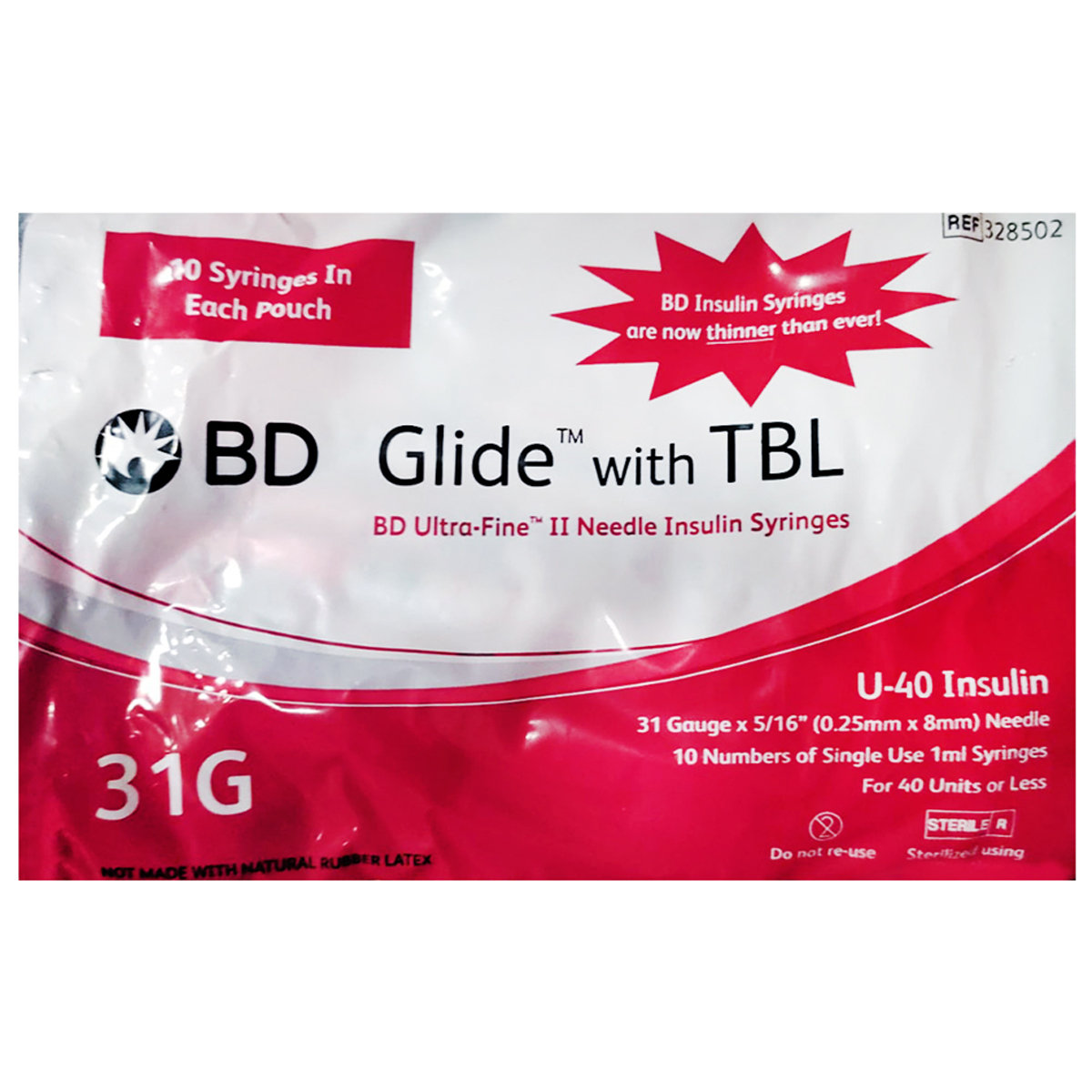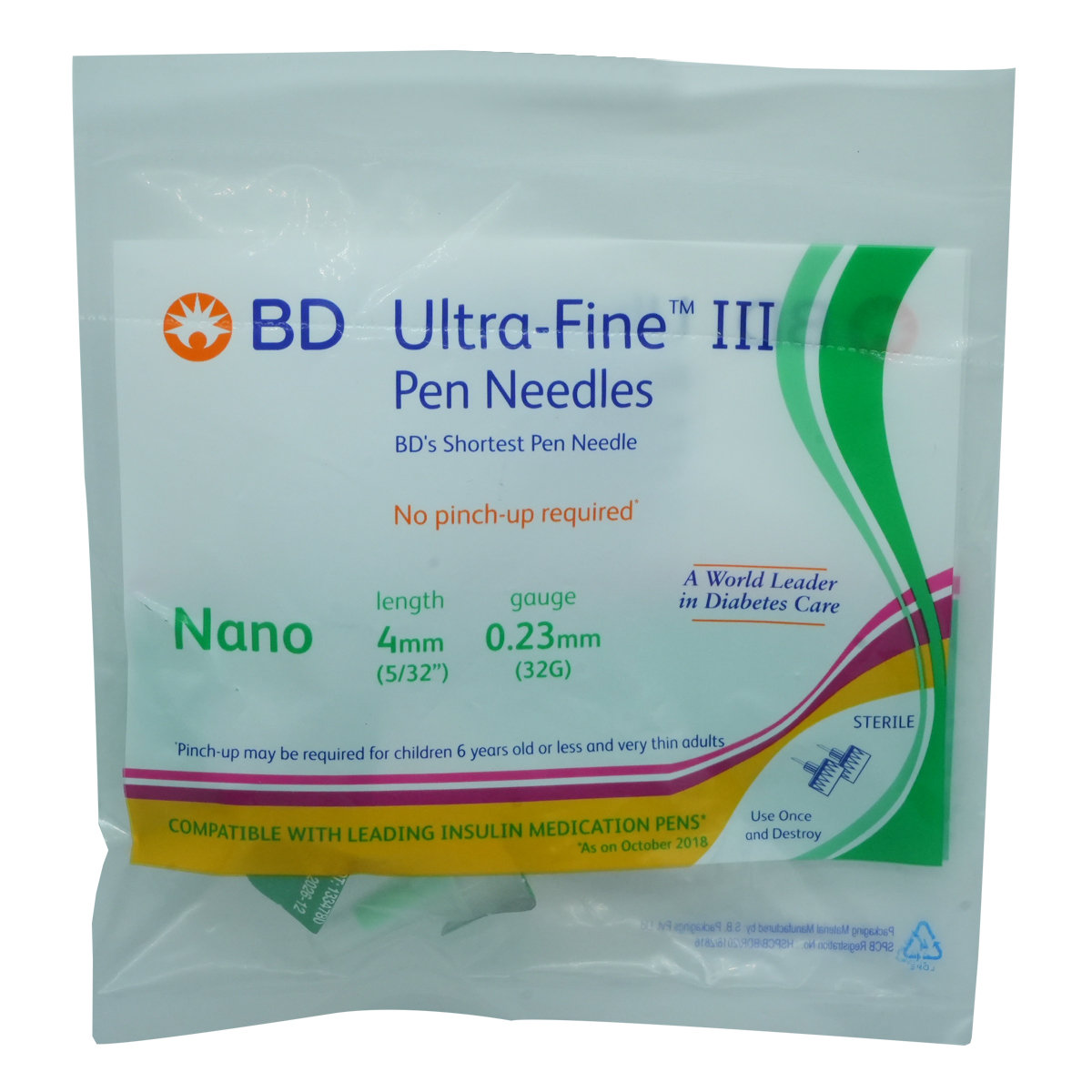Apidra 100IU Cartridge 3 ml
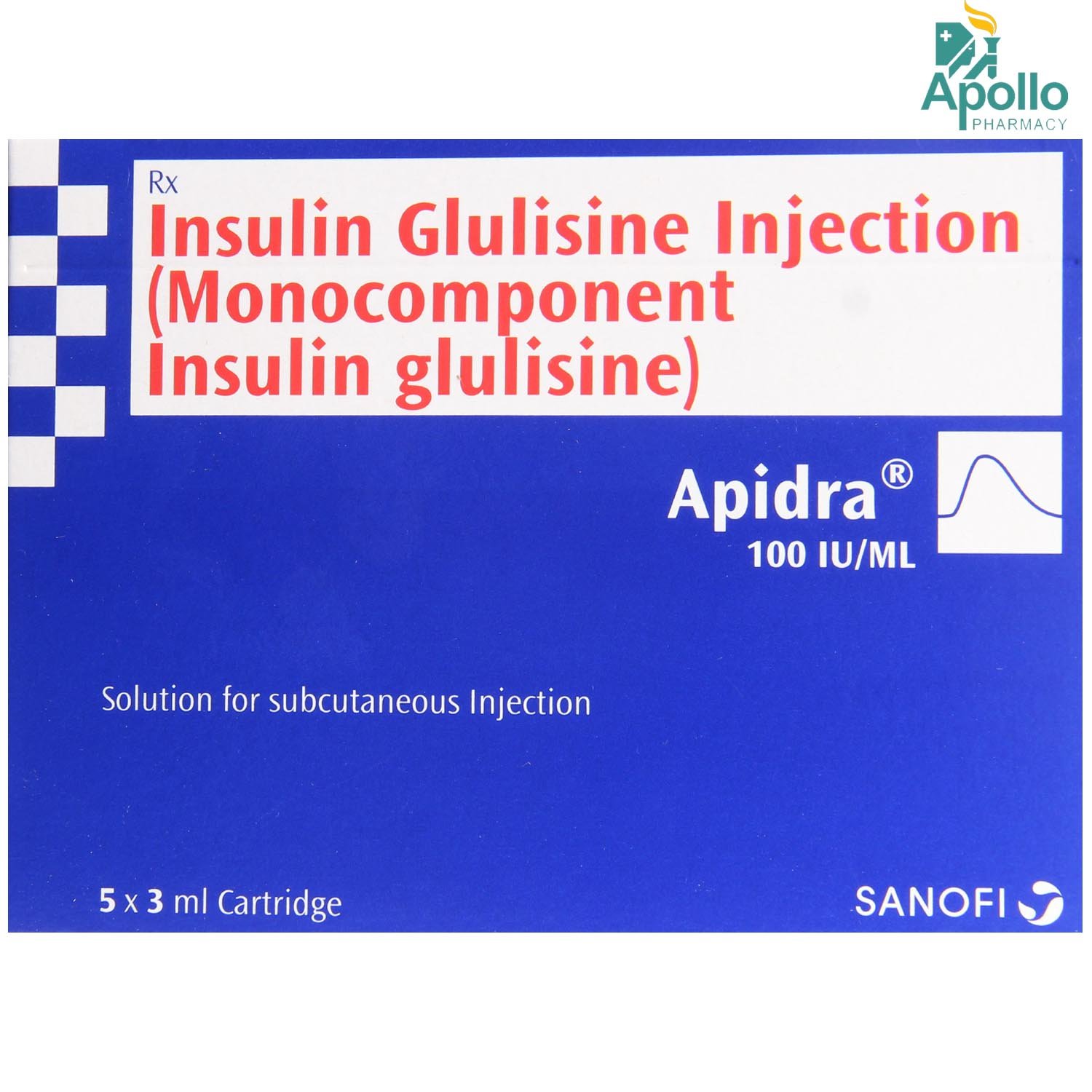
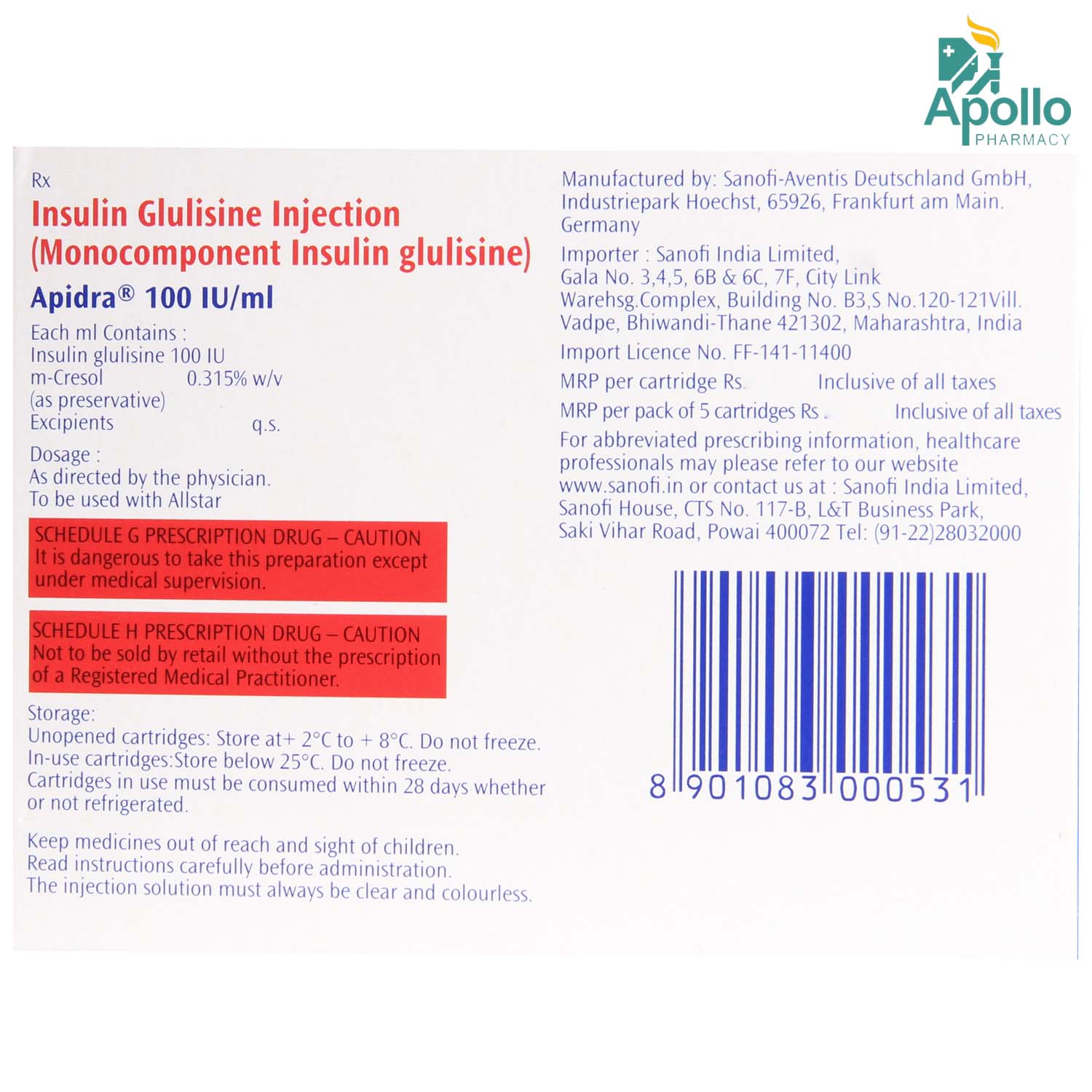
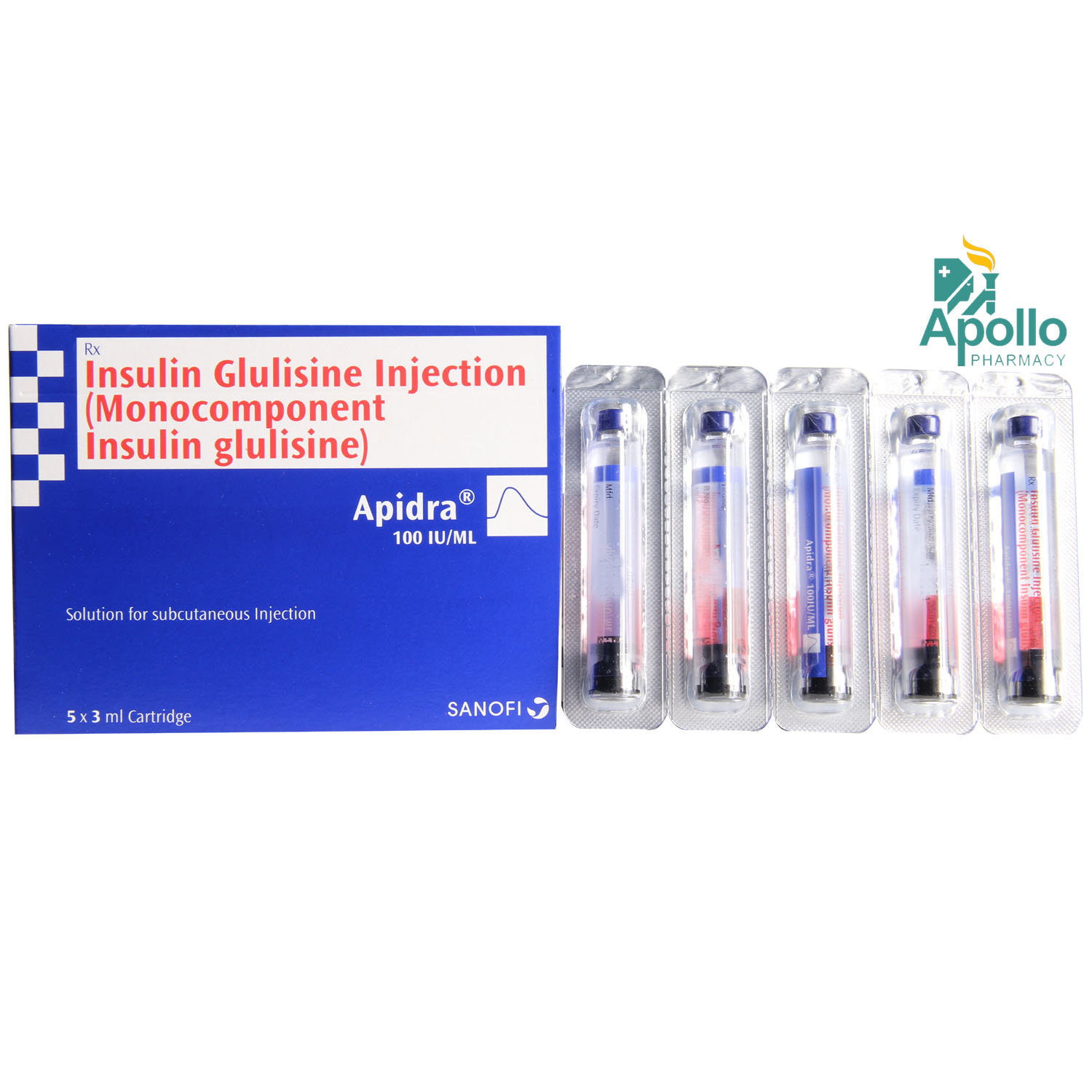
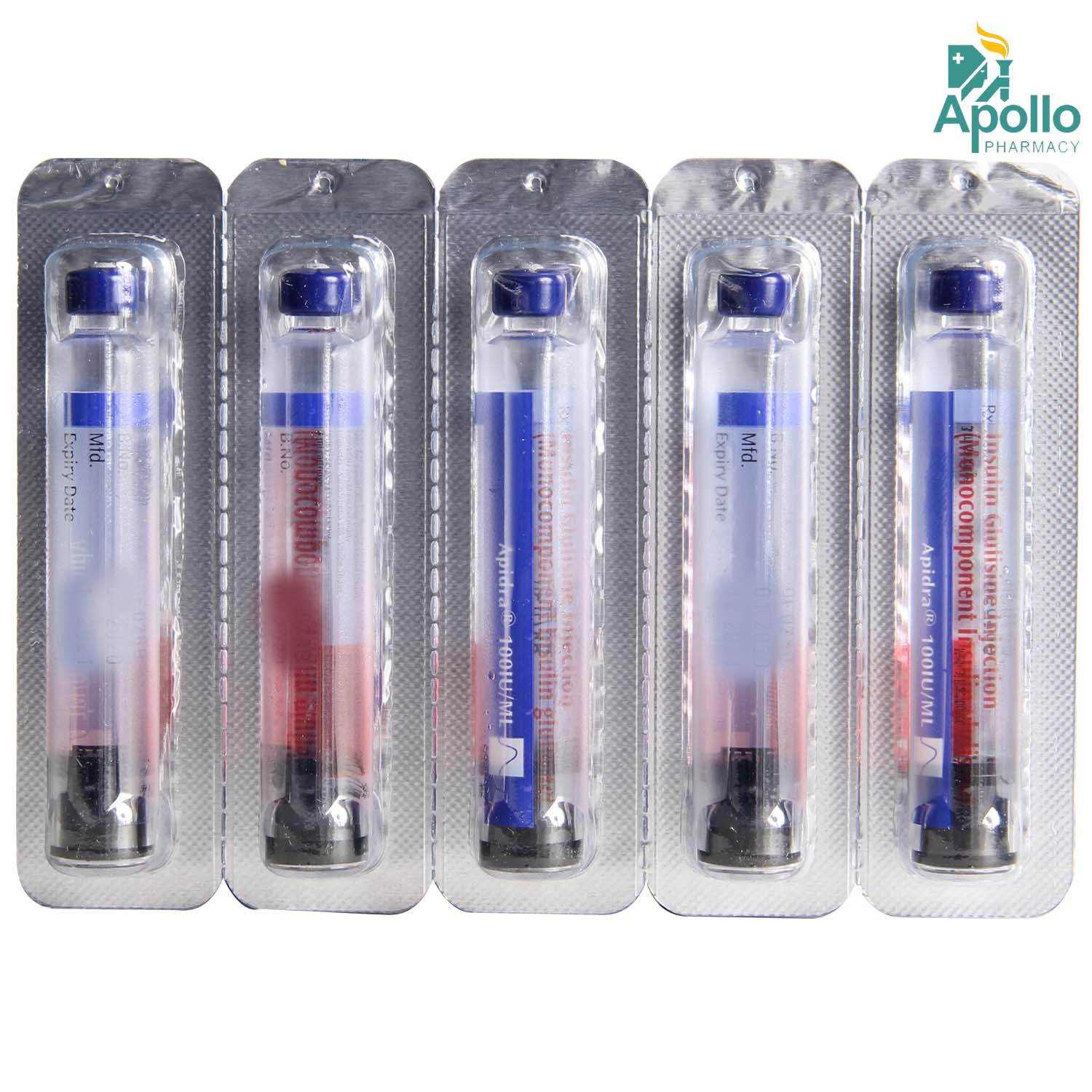
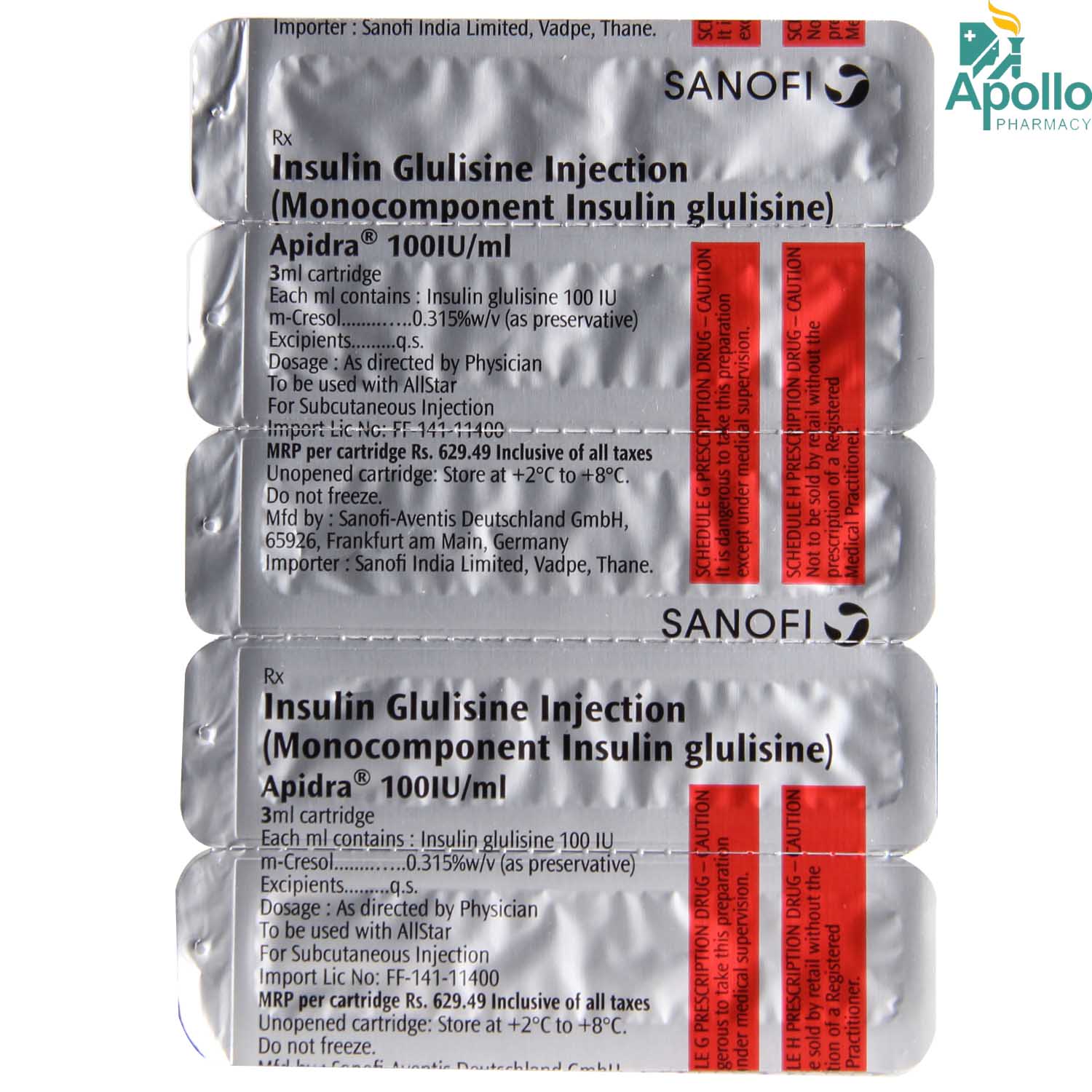
MRP ₹837
(Inclusive of all Taxes)
₹125.5 Cashback (15%)
Apidra 100IU Cartridge 3 ml is used for the treatment of diabetes mellitus in both children (above six years of age) and adults. It contains Insulin glulisine , which works rapidly to normalise blood sugar levels after a meal. It prevents the risk of having severe complications of diabetes. Insulin glulisine takes effect about twice as fast as regular human insulin and completes the glucose-lowering effect about 2 hours earlier than regular human insulin. It may cause side effects such as hypokalaemia (low potassium), hypoglycaemia (low blood sugar level), local injection site reactions, lipodystrophy (fat deposition under the skin), rash, and pruritus (itch skin), which may occur at the injection site. Before taking this medicine, you should tell your doctor if you are allergic to any of its components or if you are pregnant/breastfeeding, and about all the medications you are taking and pre-existing medical conditions.
Know Your Delivery Time
Provide Delivery Location

Secure Payment

India's Most Trusted Pharmacy

Genuine Products
Composition :
Manufacturer/Marketer :
Consume Type :
Return Policy :
Expires on or after :
About Apidra 100IU Cartridge 3 ml
Apidra 100IU Cartridge 3 ml used for the treatment of both type 1 and type 2 diabetes mellitus. In Type 1 diabetes mellitus, the body does not produce enough insulin to regulate blood sugar levels. In type 2 diabetes mellitus, either the body stops producing enough insulin (a hormone that helps lower blood sugar levels) or there is resistance to the action of insulin. As a result, insulin is produced in large quantities, but it is unable to function correctly in the body's organs.
Apidra 100IU Cartridge 3 ml contains insulin glulisine, which helps normalize blood sugar levels by facilitating the movement of sugar from the blood into other tissues of the body. It reduces the risk of severe diabetes complications. It stimulates the recovery of sugar in muscle and fat cells, thereby suppressing the production of sugar in the liver.
Not everyone who is taking Apidra 100IU Cartridge 3 ml will get these side effects. You may experience rash, injection site allergic reaction, weight gain, edema (tissue swelling or fluid overload), skin thickening at the injection site, low blood glucose levels, and itching. Most of these side effects of Apidra 100IU Cartridge 3 ml do not require medical attention and typically resolve on their own over time. However, if the side effects are persistent, reach out to your doctor.
Apidra 100IU Cartridge 3 ml should be taken before food or advised by your doctor. It should be administered subcutaneously (in the upper thigh, abdomen, upper arm, or buttocks) only. Your doctor will explain how to administer the medicine yourself. However, if it is difficult to inject the medicine, ask a healthcare professional to take it. Along with Apidra 100IU Cartridge 3 ml, you should maintain a healthy diet, engage in regular exercise, and adhere to your doctor's weight management advice.
Inform your doctor if you are allergic to Apidra 100IU Cartridge 3 ml. Do not take Apidra 100IU Cartridge 3 ml if you have any low blood glucose levels, kidney, liver, or heart problems, or problems with alcohol or other prescription or recreational drugs. Try not to stop receiving Apidra 100IU Cartridge 3 ml of your own. Let your doctor know about this, as it may cause withdrawal symptoms. Apidra 100IU Cartridge 3 ml is a cold chain medicine, and so it must be stored in the refrigerator between 2-8 degrees Celsius, or else its efficiency might get lost. Do not store in the freezer or the fridge.
Uses of Apidra 100IU Cartridge 3 ml
Apidra 100IU Cartridge 3 ml is used in the treatment of Diabetes (Type 1 diabetes mellitus, Type 2 diabetes mellitus). The detailed uses of Apidra 100IU Cartridge 3 ml are as follows:
- Diabetes Management: Apidra 100IU Cartridge 3 ml is primarily used to regulate blood glucose levels in individuals with diabetes mellitus, helping to keep them within a healthy range.
- Postprandial Blood Sugar Control: Apidra 100IU Cartridge 3 ml effectively manages postprandial (after-meal) blood sugar spikes through its combination of intermediate and short-acting insulin.
- Type 1 and Type 2 Diabetes Treatment: Apidra 100IU Cartridge 3 ml is prescribed for patients with Type 1 and Type 2 diabetes who are unable to achieve adequate glycemic control with oral hypoglycemic agents alone.

Have a query?
Directions for Use
- Apidra 100IU Cartridge 3 ml is usually injected 15 minutes before a meal or within 20 minutes after starting a meal or as advised by your doctor.
- Follow your doctor's instructions on the dosage and timing of this medication.
- Check the label for directions and use it as advised by the doctor.
- Choose an injection site such as the thigh, upper arm, or abdomen, pinch the skin, and inject the advised dose at a 45-degree angle slowly and steadily.
- Rotate the injection site every time.
- Do not inject into skin that is red, bruised, or hard.
- Do not reuse or share needles.
Medicinal Benefits
- The primary role of insulin and insulin analogues, including insulin glulisine, is glucose metabolism control.
- Insulin lowers blood glucose levels by stimulating peripheral glucose uptake, particularly skeletal muscle and fat, and inhibiting hepatic glucose production.
- Apidra 100IU Cartridge 3 ml is an antidiabetic medicine primarily used for the treatment of both type 1 and type 2 diabetes mellitus.
- It prevents the risk of having severe complications of diabetes. It stimulates the recovery of sugar in muscle and fat cells, thereby suppressing sugar production in the liver.
- Apidra 100IU Cartridge 3 ml helps improve glycaemic control, which in turn decreases the risk of complications of diabetes, such as damage to the retina (retinopathy), damage to the kidneys (nephropathy), impairment of nerve cells (neuropathy), delayed wound healing, diabetic foot ulcers, and others.
- Apidra 100IU Cartridge 3 ml can also be safely prescribed to the diabetic mother during pregnancy and lactation.
- It stimulates the recovery of sugar in muscle and fat cells and thus suppresses the production of sugar in the liver.
How Apidra 100IU Cartridge 3 ml Works
Storage
- Inform your doctor about the common cold symptoms you're experiencing due to medication.
- Your doctor may adjust your treatment plan, which could include changing your medication, adding new medications, or offering advice on managing your symptoms.
- Practice good hygiene, including frequent handwashing, avoiding close contact with others, and avoiding sharing utensils or personal items.
- Drink plenty of fluids, such as warm water or soup, to help thin out mucus.
- Get plenty of rest and engage in stress-reducing activities to help your body recover. If your symptoms don't subside or worsen, consult your doctor for further guidance.
- Inform your doctor about the symptoms you're experiencing due to medication.
- Your doctor may adjust your treatment plan, which could include changing your medication, adding new medications, or offering advice on managing your symptoms.
- Practice good hygiene, including frequent handwashing, avoiding close contact with others, and avoiding sharing utensils or personal items.
- Stay hydrated by drinking plenty of fluids to help loosen and clear mucus from your nose, throat, and airways.
- Get plenty of rest and engage in stress-reducing activities to help your body recover. If your symptoms don't subside or worsen, consult your doctor for further guidance.
- If you experience low blood sugar levels, inform your doctor. They will assess the severity and make recommendations for the next actions.
- Your doctor will assess your symptoms, blood sugar levels, and overall health before recommending the best course of action, which may include treatment, lifestyle modifications, or prescription adjustments.
- Follow your doctor's instructions carefully to manage the episode and adjust your treatment plan.
- Make medication adjustments as recommended by your doctor to prevent future episodes.
- Implement diet and lifestyle modifications as your doctor advises to manage low blood sugar levels.
- Monitor your blood sugar levels closely for patterns and changes.
- Track your progress by recording your blood sugar levels, food intake, and physical activity.
- Seek further guidance from your doctor if symptoms persist or worsen so that your treatment plan can be revised.
- Please inform your doctor about joint pain symptoms, as they may adjust your medication regimen or prescribe additional medications to manage symptoms.
- Your doctor may prescribe common pain relievers if necessary to treat joint discomfort.
- Maintaining a healthy lifestyle is key to relieving joint discomfort. Regular exercise, such as low-impact sports like walking, cycling, or swimming, should be combined with a well-balanced diet. Aim for 7-8 hours of sleep per night to assist your body in repairing and rebuilding tissue.
- Applying heat or cold packs to the affected joint can help reduce pain and inflammation.
- Please track when joint pain occurs and any factors that may trigger it, and share this information with your doctor to help manage symptoms.
- If your joint pain is severe or prolonged, consult a doctor to rule out any underlying disorders that may require treatment.
- Rest well; get enough sleep. This helps the body fight infection.
- Keep yourself hydrated by drinking enough water and other fluids.
- Wash your hands often and avoid touching your eyes, mouth or nose.
- Wear a mask whilst going out.
- Warm steam or a hot shower may help with nose secretions.
- Avoid contact with others to prevent contamination.
- Hydrate your body: Drink enough water to prevent dehydration and headaches.
- Calm Your Mind: Deep breathing and meditation can help you relax and relieve stress.
- Rest and Recharge: Sleep for 7-8 hours to reduce headache triggers.
- Take rest: lie down in a quiet, dark environment.
- Cold or warm compresses can help reduce tension.
- Stay Upright: Maintain good posture to keep symptoms from getting worse.
- To treat headaches naturally, try acupuncture or massage therapy.
- Over-the-counter pain relievers include acetaminophen and ibuprofen.
- Prescription Assistance: Speak with your doctor about more substantial drug alternatives.
- Severe Headaches: Seek emergency medical assistance for sudden, severe headaches.
- Frequent Headaches: If you get reoccurring headaches, consult your doctor.
- Headaches with Symptoms: Seek medical attention if your headaches include fever, disorientation, or weakness.
- Inform Your Doctor: Notify your doctor immediately about your diarrhoea symptoms. This allows them to adjust your medication or provide guidance on managing side effects.
- Stay Hydrated: Drink plenty of fluids to replace lost water and electrolytes. Choose water, clear broth, and electrolyte-rich drinks. Avoid carbonated or caffeinated beverages to effectively rehydrate your body.
- Follow a Bland Diet: Eat easy-to-digest foods to help firm up your stool and settle your stomach. Try incorporating bananas, rice, applesauce, toast, plain crackers, and boiled vegetables into your diet.
- Avoid Trigger Foods: Steer clear of foods that can worsen diarrhoea, such as spicy, fatty, or greasy foods, high-fibre foods, and dairy products (especially if you're lactose intolerant).
- Practice Good Hygiene: Maintain good hygiene to prevent the spread of infection. To stay healthy, wash your hands frequently, clean and disinfect surfaces regularly, and avoid exchanging personal belongings with others.
- Take Anti-Diarrheal Medications: If your doctor advises, anti-diarrheal medications such as loperamide might help manage diarrhoea symptoms. Always follow your doctor's directions.
- Keep track of your diarrhoea symptoms. If they don't get better or worse or are accompanied by severe stomach pain, blood, or dehydration signs (like extreme thirst or dark urine), seek medical help.
What if I have taken an overdose of Apidra 100IU Cartridge 3 ml
Drug Warnings
- Inform your doctor if you are allergic to Apidra 100IU Cartridge 3 ml. Do not take Apidra 100IU Cartridge 3 ml if you have any low blood glucose levels, kidney, liver, or heart problems, or problems with alcohol or other prescription or recreational drugs.
- Try not to stop receiving Apidra 100IU Cartridge 3 ml of your own. Let your doctor know about this, as it may cause withdrawal symptoms. Apidra 100IU Cartridge 3 ml may decrease the level of potassium, leading to a state of hypokalaemia that, if left untreated, may lead to respiratory paralysis, irregular heartbeat rhythm, coma, and even death.
- Apidra 100IU Cartridge 3 ml is for subcutaneous (under the skin) use only. If you are switching to a different insulin brand or using a different method of injection, it should be done under strict medical supervision.
- Cases of heart failure have been reported when pioglitazone was used with insulin, especially in patients at high risk of cardiac heart failure.
- The first symptoms of hyperglycemia (high blood sugar levels) may include excessive thirst, dry mouth, increased frequency of urination, nausea, vomiting, drowsiness, flushed dry skin, loss of appetite, and an acetone odour in the breath. You should closely monitor these symptoms.
- It is advisable not to consume alcohol, as it may either increase or decrease your blood glucose level.
- Care should be taken while travelling across more than two time zones. Your doctor may adjust your insulin schedule.
- Apidra 100IU Cartridge 3 ml is a cold chain medicine, and therefore it must be stored in the refrigerator at a temperature between 2-8 degrees Celsius, or else its efficiency may be compromised. Do not store in the freezer or the fridge.
- Keep the medicine out of reach of children. Please do not inject more than the recommended dose of medicine, as it can cause undesirable effects.
- It is always important to check the expiry date of the medicine. Discard the medicine if it reaches the expiry date.
Drug-Drug Interactions
Drug-Drug Interactions
Login/Sign Up
Taking Apidra 100IU Cartridge 3 ml with sparfloxacin affects blood glucose levels, which may cause hyperglycemia (high blood sugar) and hypoglycemia (low blood sugar) less frequently.
How to manage the interaction:
Although taking Sparfloxacin and Apidra 100IU Cartridge 3 ml together can possibly result in an interaction, it can be taken if your doctor has prescribed it. However, consult the doctor immediately if you experience hypoglycemia or hyperglycemia. Symptoms of hypoglycemia include headache, dizziness, drowsiness, nervousness, confusion, shaking, nausea, loss of hunger, weakness, sweating, palpitations, and rapid heartbeat. Symptoms of hyperglycemia may include increased thirst, increased hunger, and increased urination. Do not stop using any medications without first talking to your doctor.
Taking ciprofloxacin with Apidra 100IU Cartridge 3 ml can effect blood sugar levels, both hyperglycemia (high blood sugar) and, less frequently, hypoglycemia (low blood sugar).
How to manage the interaction:
Although taking Ciprofloxacin and Apidra 100IU Cartridge 3 ml together can possibly result in an interaction, it can be taken if your doctor has prescribed it. However, consult the doctor immediately if you experience hypoglycemia or hyperglycemia. Symptoms of hypoglycemia include headache, dizziness, drowsiness, nervousness, confusion, shaking, nausea, loss of hunger, weakness, sweating, palpitations, and rapid heartbeat. Symptoms of hyperglycemia may include increased thirst, increased hunger, and increased urination. Do not stop using any medications without talking to a doctor.
Taking Apidra 100IU Cartridge 3 ml with enoxacin affects blood glucose levels, which may cause hyperglycemia (high blood sugar) and hypoglycemia (low blood sugar) less frequently.
How to manage the interaction:
Although taking Enoxacin and Apidra 100IU Cartridge 3 ml together can possibly result in an interaction, it can be taken if your doctor has prescribed it. However, consult the doctor immediately if you experience hypoglycemia or hyperglycemia. Symptoms of hypoglycemia include headache, dizziness, drowsiness, nervousness, confusion, shaking, nausea, loss of hunger, weakness, sweating, palpitations, and rapid heartbeat. Symptoms of hyperglycemia may include increased thirst, increased hunger, and increased urination. Do not stop using any medications without first talking to your doctor.
Blood glucose levels can be affected by levofloxacin when taken with Apidra 100IU Cartridge 3 ml. They may cause hyperglycemia (high blood glucose) and, less commonly, hypoglycemia (low blood glucose).
How to manage the interaction:
Although taking Levofloxacin and Apidra 100IU Cartridge 3 ml together can result in an interaction, it can be taken if a doctor has prescribed it. However, consult the doctor immediately if you experience hypoglycemia or hyperglycemia. Symptoms of hypoglycemia include headache, dizziness, drowsiness, nervousness, confusion, shaking, nausea, loss of hunger, weakness, sweating, palpitations, and rapid heartbeat. Symptoms of hyperglycemia may include increased thirst, increased hunger, and increased urination. Do not stop using any medications without talking to a doctor.
Taking Apidra 100IU Cartridge 3 ml with grepafloxacin affects blood glucose levels, which may cause hyperglycemia (high blood sugar) and hypoglycemia (low blood sugar) less frequently.
How to manage the interaction:
Although taking Grepafloxacin and Apidra 100IU Cartridge 3 ml together can possibly result in an interaction, it can be taken if your doctor has prescribed it. However, consult the doctor immediately if you experience hypoglycemia or hyperglycemia. Symptoms of hypoglycemia include headache, dizziness, drowsiness, nervousness, confusion, shaking, nausea, loss of hunger, weakness, sweating, palpitations, and rapid heartbeat. Symptoms of hyperglycemia may include increased thirst, increased hunger, and increased urination. Do not stop using any medications without first talking to your doctor.
Taking Apidra 100IU Cartridge 3 ml with cinoxacin affects blood glucose levels, which may cause hyperglycemia (high blood sugar) and hypoglycemia (low blood sugar) less frequently.
How to manage the interaction:
Although taking Cinoxacin and Apidra 100IU Cartridge 3 ml together can possibly result in an interaction, it can be taken if your doctor has prescribed it. However, consult the doctor immediately if you experience hypoglycemia or hyperglycemia. Symptoms of hypoglycemia include headache, dizziness, drowsiness, nervousness, confusion, shaking, nausea, loss of hunger, weakness, sweating, palpitations, and rapid heartbeat. Symptoms of hyperglycemia may include increased thirst, increased hunger, and increased urination. Do not stop using any medications without first talking to your doctor.
Taking Apidra 100IU Cartridge 3 ml with lomefloxacin affects blood glucose levels, which may cause hyperglycemia (high blood sugar) and hypoglycemia (low blood sugar) less frequently.
How to manage the interaction:
Although taking Lomefloxacin and Apidra 100IU Cartridge 3 ml together can possibly result in an interaction, it can be taken if your doctor has prescribed it. However, consult the doctor immediately if you experience hypoglycemia or hyperglycemia. Symptoms of hypoglycemia include headache, dizziness, drowsiness, nervousness, confusion, shaking, nausea, loss of hunger, weakness, sweating, palpitations, and rapid heartbeat. Symptoms of hyperglycemia may include increased thirst, increased hunger, and increased urination. Do not stop using any medications without first talking to your doctor.
Taking Apidra 100IU Cartridge 3 ml with norfloxacin affects blood glucose levels, which may cause hyperglycemia (high blood sugar) and hypoglycemia (low blood sugar) less frequently.
How to manage the interaction:
Although taking Norfloxacin and Apidra 100IU Cartridge 3 ml together can possibly result in an interaction, it can be taken if your doctor has prescribed it. However, consult the doctor immediately if you experience hypoglycemia or hyperglycemia. Symptoms of hypoglycemia include headache, dizziness, drowsiness, nervousness, confusion, shaking, nausea, loss of hunger, weakness, sweating, palpitations, and rapid heartbeat. Symptoms of hyperglycemia may include increased thirst, increased hunger, and increased urination. Do not stop using any medications without first talking to your doctor.
Co-administration of Ofloxacin and Apidra 100IU Cartridge 3 ml can sometimes have an effect on blood glucose levels.
How to manage the interaction:
Although combining Ofloxacin and Apidra 100IU Cartridge 3 ml can lead to an interaction, they can be taken on a doctor's advice. If you experience any symptoms of hypoglycemia (headache, dizziness, sleepiness, nervousness, confusion, shaking, nausea, loss of hunger, weakness, sweating, palpitation, and rapid heartbeat) or hyperglycemia (increased thirst, hunger, and urination), consult a doctor. Keep an eye on your blood glucose levels. Do not discontinue any medications without consulting a doctor.
Taking Apidra 100IU Cartridge 3 ml with trovafloxacin affects blood glucose levels, which may cause hyperglycemia (high blood sugar) and hypoglycemia (low blood sugar) less frequently.
How to manage the interaction:
Although taking Trovafloxacin and Apidra 100IU Cartridge 3 ml together can possibly result in an interaction, it can be taken if your doctor has prescribed it. However, consult the doctor immediately if you experience hypoglycemia or hyperglycemia. Symptoms of hypoglycemia include headache, dizziness, drowsiness, nervousness, confusion, shaking, nausea, loss of hunger, weakness, sweating, palpitations, and rapid heartbeat. Symptoms of hyperglycemia may include increased thirst, increased hunger, and increased urination. Do not stop using any medications without first talking to your doctor.
Drug-Food Interactions
Drug-Food Interactions
Login/Sign Up
Diet & Lifestyle Advise
- Exercise may lower your body’s need for insulin during and sometimes after physical activity.
- Exercise may also speed up the effect of an insulin dose, especially if the exercise involves the area of the injection site (for example, the leg should not be used for injection just prior to running).
- Discuss with your doctor how to adjust your insulin regimen to accommodate exercise.
- Avoid eating sugar food and prefer food cooked food low in calories.
- When travelling across more than two time zones, you should talk to your doctor concerning adjustments in your insulin schedule.
Habit Forming
Therapeutic Class
All Substitutes & Brand Comparisons
RX
Apidra 100IU / ml Injection 10 ml
Sanofi India Ltd
₹1687
(₹168.7/ 1ml)
39% CHEAPERRX
Apidra Solostar 100IU/ml Injection 3 ml
Sanofi India Ltd
₹1170
(₹390.0/ 1ml)
39% COSTLIER
Alcohol
Unsafe
You are recommended not to consume alcohol along with Apidra 100IU Cartridge 3 ml to avoid unpleasant side-effects. Alcohol may either decrease or increase the blood sugar level which can be fatal.
Pregnancy
Safe if prescribed
Apidra 100IU Cartridge 3 ml can be used during pregnancy. Your insulin dose may need to be changed during pregnancy and after delivery.
Breast Feeding
Safe if prescribed
Apidra 100IU Cartridge 3 ml can be given safely to nursing mothers but only under the supervision of a physician.
Driving
Caution
Drive with caution, Apidra 100IU Cartridge 3 ml usually causes drowsiness and affects driving ability. Your ability to concentrate and react may be reduced if you have hypoglycaemia (low blood sugar).
Liver
Caution
Apidra 100IU Cartridge 3 ml to be taken with caution, especially if you have a history of liver disease. The dose may have to be adjusted by your doctor.
Kidney
Caution
Apidra 100IU Cartridge 3 ml to be taken with caution, especially if you have a history of kidney disease. The dose may have to be adjusted by your doctor.
Children
Safe if prescribed
Apidra 100IU Cartridge 3 ml can be given safely to children provided; dose has to be prescribed by a child specialist.
Heart
Apidra 100IU Cartridge 3 ml should be administered with caution in patients with heart problems. Please inform your doctor about any existing heart problems before using Apidra 100IU Cartridge 3 ml.
Geriatrics
Caution
Apidra 100IU Cartridge 3 ml should be administered with caution in elderly patients. If you have any concerns, please consult your doctor.
FAQs
Apidra 100IU Cartridge 3 ml is rapid-acting insulin used for the treatment of diabetes mellitus in both children (above six years of age) and adults. Insulin lowers blood glucose levels by stimulating peripheral glucose uptake, particularly skeletal muscle and fat, and inhibiting hepatic glucose production.
Insulin kept out of the refrigerator will not poison you or even make you sick. It just means that your insulin will not work as well or deliver its full potential dose. In simple terms, if your blood sugar is high, and you use the insulin that has been kept out, your blood sugar may not be lowered.
Insulin is released from the beta cells in your pancreas in response to the rise in glucose in your bloodstream. After you have consumed a meal, any carbohydrate you have eaten is broken down into glucose and transferred into the bloodstream. The pancreas detects this rise in blood glucose and starts to secrete insulin.
Habitual moderate coffee drinking has actually been associated with increased insulin sensitivity and lowered risk for type 2 diabetes. But in acute and high doses, caffeine can decrease insulin sensitivity and raise plasma insulin levels.
Insulin is released from the beta cells present in your pancreas in response to rising glucose in your bloodstream. The pancreas detects this rise in blood glucose and starts to secrete insulin.
A hard-boiled egg is a handy high-protein snack when you have diabetes. Your protein will help keep you full without impacting your blood sugar. Protein not only slows down digestion, but it also slows down the absorption of glucose. If you have diabetes, this is very beneficial.
Pramlintide, Ethanol (Alcohol) and Macimorelin have got serious interactions with Apidra 100IU Cartridge 3 ml. So, do not take these medicines with Apidra 100IU Cartridge 3 ml.
Apidra 100IU Cartridge 3 ml can be given to treat both the condition of type 1 and type 2 diabetes mellitus. However, your doctor will decide whether Apidra 100IU Cartridge 3 ml can be given to you or not, depending on your present condition. Apidra 100IU Cartridge 3 ml should be avoided in patients who are allergic to Apidra 100IU Cartridge 3 ml or other forms of insulin, patients with kidney disease, liver disease, low blood sugar/glucose level (hypoglycaemia), and low potassium level (hypokalaemia).
The side effects of Apidra 100IU Cartridge 3 ml include injection site reactions (such as reddening, unusually intense pain on injection, itching, hives, swelling or inflammation), low blood sugar, low potassium levels, rash, itchy skin, and fat deposition under the skin. If these side effects persist or worsen, please consult your doctor.
You are recommended to avoid white bread, maida, poori, naan, noodles, biryani, fried rice, corn flakes, cheese, ice creams, milkshakes, beef, pork, sugarcane juice, soft drinks, sweetened health drinks and beverages. Also, avoid mango, seetaphal, jack fruit, fruit salads with ice cream, and fruit-based desserts.
No, do not stop taking Apidra 100IU Cartridge 3 ml without consulting your doctor as it may lead to high blood sugar levels and may worsen your condition resulting in complications. If you experience any side effects or discomfort, contact your doctor. You may need dose adjustment.
Taking injection at the same site may cause local irritation, itching and lump formation. Therefore, it is best to avoid taking injections at the same site or maintain a gap of at least one day.
Maintain a diet that includes chapatis, puffed rice with vegetables, multigrain bread, plain cooked dal, roasted grams soups, sprouts, cooked vegetables with less oil, steamed vegetables, orange, jamun, guava, watermelon, apple, papaya, curd, cow’s milk, thin buttermilk, fish (baked, grilled, or steamed), cashew nuts, peanuts, and walnuts (handful). Avoid alcohol consumption and quit smoking. Exercise regularly and brisk walk daily for 30 minutes. Also, limit intake of sugar.
The risk factors for developing low blood sugar levels include not taking adequate meals or skipping meals, excessive insulin use, too much alcohol intake, fever and too much exercise. Some medications, like other diabetes medicine glimepiride, medicines used for fever and pain (salicylates), ramipril, etc., can result in such episodes when used with insulin. Inform your doctor about these episodes as you may need dose adjustment.
You are recommended to be extra cautious if you are about to take Apidra 100IU Cartridge 3 ml with pioglitazone as Pioglitazone may cause fluid retention in your body, particularly when used along with insulin. You may develop heart failure symptoms such as swelling of hands and feet, edema, weight gain, breathlessness, etc. Also if you already have heart failure, it could worsen. Thus, please consult your doctor first before taking Apidra 100IU Cartridge 3 ml with other medicines.
Apidra 100IU Cartridge 3 ml contains a fast-acting insulin. Injecting Apidra 100IU Cartridge 3 ml into a muscle would accelerate its absorption and increase the risk of serious episode of hypoglycemia (low blood sugar). Therefore, you should inject Apidra 100IU Cartridge 3 ml just beneath the skin by pinching up some skin and fat.
Yes, you need to be careful about symptoms of hypoglycaemia (low blood sugar) such as increased heart rate may not be recognized by you. Thus, monitor your blood sugar regularly and consult your doctor if the problem persists.
It depends on whether you have type 1 diabetes mellitus or type 2. For patients with type 1, the only treatment available is external source of insulin which cannot be stopped, as your body does not produce adequate insulin. However, for patients with type 2 diabetes mellitus, the doctor may stop Apidra 100IU Cartridge 3 ml if your blood sugar levels are well controlled with healthy diet, exercise and other diabetic medications. However, do not stop taking it on your own without consulting your doctor as it may worsen your condition.
Yes, Apidra 100IU Cartridge 3 ml can cause hypoglycemia (low blood sugar levels). The symptoms include hunger, dizziness, sweating, nausea, irritability, headache, fast heart rate and feeling anxious or shaky. It occurs more frequently if you skip or delay meals, over-exercise, drink alcohol, or take other antidiabetic medicine along with it. So, it is important to regularly monitor blood sugar level. Always carry some sugary candies, fruit juice, glucose, or glucon-D with you.
Apidra 100IU Cartridge 3 ml belongs to the class of antidiabetic drugs. It is a man-made form of insulin which is prescribed in diabetic adults and children of age 1 year and above. It helps improve blood sugar levels and glycemic control.
Country of origin
Manufacturer/Marketer address
Customers Also Bought
Disclaimer
Keep Refrigerated. Do not freeze.Prepaid payment required.
Author Details
We provide you with authentic, trustworthy and relevant information
Buy best Diabetics products by
Torrent Pharmaceuticals Ltd
Intas Pharmaceuticals Ltd
Eris Life Sciences Ltd
Lupin Ltd
Micro Labs Ltd
Sun Pharmaceutical Industries Ltd
Mankind Pharma Pvt Ltd
Alkem Laboratories Ltd
Lloyd Healthcare Pvt Ltd
Cipla Ltd
Macleods Pharmaceuticals Ltd
Abbott India Ltd
Primus Remedies Pvt Ltd
Glenmark Pharmaceuticals Ltd
Aristo Pharmaceuticals Pvt Ltd
Dr Reddy's Laboratories Ltd
USV Pvt Ltd
La Renon Healthcare Pvt Ltd
Wockhardt Ltd
Emcure Pharmaceuticals Ltd
Fusion Health Care Pvt Ltd
Ajanta Pharma Ltd
Ipca Laboratories Ltd
Alembic Pharmaceuticals Ltd
Corona Remedies Pvt Ltd
East West Pharma India Pvt Ltd
Hbc Life Sciences Pvt Ltd
Eswar Therapeutics Pvt Ltd
Zydus Healthcare Ltd
Alteus Biogenics Pvt Ltd
Elbrit Life Sciences Pvt Ltd
Mitoch Pharma Pvt Ltd
Medley Pharmaceuticals Ltd
Ranmarc Labs
Sinsan Pharmaceuticals Pvt Ltd
Msn Laboratories Pvt Ltd
Nirvana India Pvt Ltd
Tas Med India Pvt Ltd
Akumentis Healthcare Ltd
Arkas Pharma Pvt Ltd
Unison Pharmaceuticals Pvt Ltd
Leeford Healthcare Ltd
Acmedix Pharma Llp
Sanofi India Ltd
Q Check Pharmaceuticals
Novo Nordisk India Pvt Ltd
Blue Cross Laboratories Pvt Ltd
Xemex Life Sciences
Neucure Lifesciences Pvt Ltd
Alvio Pharmaceuticals Pvt Ltd
Anthem Bio Pharma
Spectra Therapeutics Pvt Ltd
Sydmen Life Sciences Pvt Ltd
Aareen Healthcare Pvt Ltd
Diacardus Pharmacy Pvt Ltd
Jubilant Lifesciences Ltd
Talent India Pvt Ltd
Edoc Life Sciences Pvt Ltd
Stature Life Sciences Pvt Ltd
Systopic Laboratories Pvt Ltd
Panacea Biotec Ltd
Sanz Pharmaceuticals
Shrrishti Health Care Products Pvt Ltd
Verse Lifesciences
Akesiss Pharma Pvt Ltd
Franco Indian Pharmaceuticals Pvt Ltd
Hicxica Formulations Pvt Ltd
Indoco Remedies Ltd
Lividus Pharmaceuticals Pvt Ltd
Capital Pharma
Elinor Pharmaceuticals (P) Ltd
Saan Labs
Zydus Cadila
Biocon Ltd
Eli Lilly and Company (India) Pvt Ltd
Lippon Pharma Pvt Ltd
MERAKI HEALTH
Remedy Life Sciences Pvt Ltd
Koye Pharmaceuticals Pvt Ltd
Morepen Laboratories Ltd
Eysys Pharmaceutical Pvt Ltd
MEDICAMEN BIOTECH LTD
Atos Lifesciences Pvt Ltd
Azkka Pharmaceuticals Pvt Ltd
Converge Biotech Pvt Ltd
Erinyle Health Care Pvt Ltd
Elder Pharmaceuticals Ltd
FDC Ltd
Heal (India) Laboratories Pvt Ltd
Knoll Healthcare Pvt Ltd
Jarun Pharmaceuticals Pvt Ltd
Opsis Care Lifesciences Pvt Ltd
Vasu Organics Pvt Ltd
Wallace Pharmaceuticals Pvt Ltd
CADOMAX HEALTHCARE PVT. LTD
Cadomed Pharmaceuticals India Pvt Ltd
Daylon healthcare pvt Ltd
Lincoln Pharmaceuticals Ltd
Medicure Life Sciences Pvt Ltd
Olcare Laboratories Pvt Ltd


